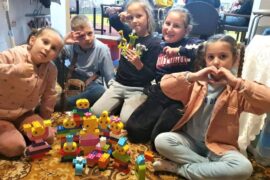Cultivating Positive Friend Experiences for Your Child: A Parent’s Guide
Hey, Super Parents! Do you remember the magic of childhood friendships? The secret handshakes, the pinky promises, and the seemingly endless playdates that shaped who we are today? ? As parents, you now have the delightful task of guiding your little ones through the exciting world of friendships. But, where do you begin? Fear not! This comprehensive guide will walk you through creating a nurturing environment for your kiddo to form those giggly, joyous, and meaningful friend experiences. ?
Understanding the Importance of Childhood Friendships
First up, let’s dive into the nitty-gritty of why friendships are so important for your child’s social and emotional development. Friends are much more than just playmates; they’re the cornerstones of your little one’s understanding of trust, collaboration, and empathy. ?
The Childhood Friendship Landscape
Childhood is a time bustling with opportunities to learn and grow, and friendships play a key role in that journey. Through friendships, children develop crucial life skills such as problem-solving, sharing, and negotiating. Plus, let’s not forget the confidence boost and sense of belonging that accompany solid friendships. ?
How to Help Your Child Make Friends
Making friends can be as easy as sharing a toy, or it can be as complex as navigating a social minefield. As awesome sidekicks, here’s how you can help:
- Encourage social opportunities: Whether it’s playgroups, sports, or art classes, getting your tiny tot involved in social activities can be the golden ticket to making friends. Look for activities that match your child’s interests and give them the chance to interact with peers. ??
- Model positive social behavior: Kids are like sponges – they soak up everything they see! Show them what it looks like to be kind, inclusive, and a good listener. By modeling these behaviors, you’ll arm your child with the best friend-making tools. ??
- Discuss friendships: Have regular chats about what makes a good friend and the qualities they should look for in buddies. Remember, it’s about quality, not quantity! ?
Supporting Your Child Through Friendship Challenges
No adventure is without its dragons, right? So, when the road to friendship gets bumpy, it’s time for a little parental guidance. Here’s what you can do:
- Listen and validate their feelings: If your wee one is having friend troubles, be their safe harbor. Listen to their woes and let them know their feelings are valid. ?
- Provide gentle guidance: It’s tempting to bust out the cape and swoop in to save the day. However, guiding your child to solve their own social challenges can be more powerful. Offer advice, but let them be the hero of their story. ????
- Teach conflict resolution: Equip your child with the skills to resolve disagreements in a healthy way. Role-playing can be a fantastic method to practice these new skills in a low-pressure environment. ?
As the story unfolds, remember that each child is unique, and thus, their pathway to making and maintaining friendships will also be unique. Your support, combined with their own experiences, will pave the way for friendships that are as deep and rich as a double-chocolate cake. ?
With your guidance, these early friendships can blossom into lifelong bonds that inspire stories of their own, stories that your children might one day recount to their children, reaffirming the timeless wonder of a childhood friend experience. ??
Stay with us as we delve deeper into this friendship journey, exploring ways to keep the connections your children make strong and ensuring they navigate the ebb and flow of childhood relationships with grace, resilience, and joy. It’s a beautiful path, and you’re the guide – let’s make it an unforgettable adventure. ?
Remember, as we continue to craft a haven for your child’s social growth, we’ll share everything from troubleshooting guides on handling tough situations to celebrating the wins of your child’s social milestones. So, let’s turn the page together and discover the enchanting world of friendship experiences, each one a building block to your little one’s story. ??

5 Things Parents Should Know in Preparing For Friend Experience
Embarking on the journey of friendship with your child is a thrilling odyssey. To make sure you’re well-equipped, here are five things to keep in mind:
1. Understand That Every Child Is Different
Not all children jump into friendships with the same eagerness. Some are social butterflies, while others are more reserved. Recognize and embrace your child’s individuality. Observe how they interact in social settings and tailor your encouragement to their comfort level.
2. Balance Involvement and Independence
It’s essential to strike a delicate balance between being involved in your child’s social life and giving them the space to learn on their own. Offer support when necessary but allow them the freedom to explore friendships autonomously, making their own judgments and decisions.
3. The Role Of Playdates
Playdates are a fantastic way for children to forge friendships. But there’s a bit of an art to them! Set up an environment that’s conducive to interaction and fun. Keep playdates in small groups to prevent children from feeling overwhelmed and arrange a variety of activities that encourage cooperation and team building.
4. Equip Them with Social Skills
Don’t leave social skill-building to chance. Proactively teach your child about sharing, taking turns, expressing their feelings appropriately, and listening to others. Introduce these concepts through stories or games, aiding them in understanding the dynamics of interpersonal relationships.
5. Respect Their Friendship Choices
While you may have an idea of who would make the perfect friend for your child, it’s crucial to respect their choices. Children can surprise us with whom they bond with and why. Trust their instinct, and guide them on how to identify and cultivate positive relationships.
Raising a socially adept child might seem like a challenge, but with your support and this guide’s wisdom, you can turn it into an exciting adventure. Embrace this special time in your child’s development and watch as they grow into well-rounded individuals with the ability to establish and maintain friendships that enrich their lives and the lives of others.
Nurturing Lasting Friendships
Building friendships is only the beginning. Helping your child to maintain those friendships is equally important. Encourage frequent interactions, be it through in-person playdates, virtual hangouts, or simply sending cheerful notes to keep the friendship spark alive. Understand that friendships can ebb and flow and teach your child how to adapt to these changes. Celebrate their friendship milestones, and always be there to talk about any concerns or questions they may have about their relationships with friends.
Friendships are among the most precious gifts we can give our children. They provide our kids with joy, comfort, and learning experiences that shape them into who they are. Let’s cherish and nurture these bonds, for they are the threads that weave the beautiful tapestry of our children’s lives.
As the saying goes – “It takes a village to raise a child,” and part of that village includes friends who will stand by them through life’s ups and downs. So, let’s work together to create a village filled with laughter, support, understanding, and, most of all, friendship. ?
For more great articles please see here. For more information see here
Disclaimer
The articles available via our website provide general information only and we strongly urge readers to exercise caution and conduct their own thorough research and fact-checking. The information presented should not be taken as absolute truth, and, to the maximum extent permitted by law, we will not be held liable for any inaccuracies or errors in the content. It is essential for individuals to independently verify and validate the information before making any decisions or taking any actions based on the articles.




